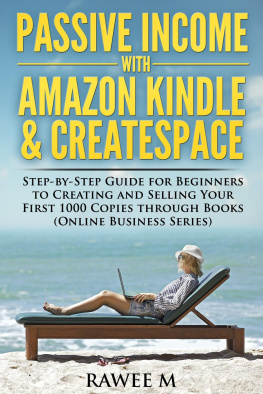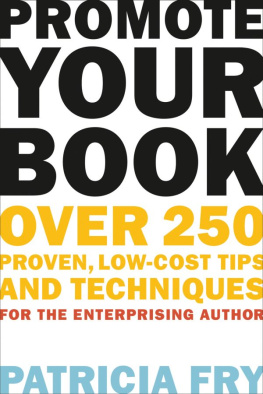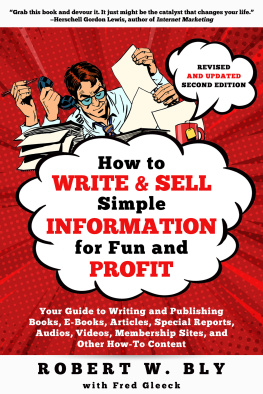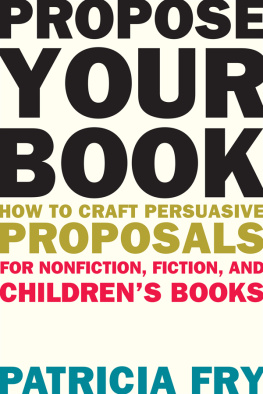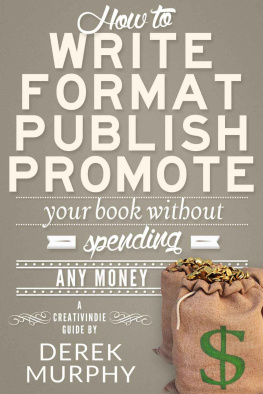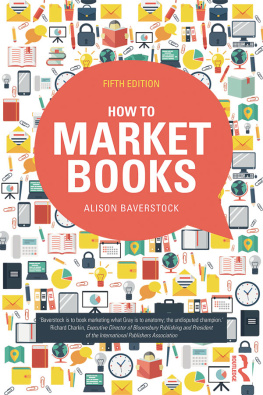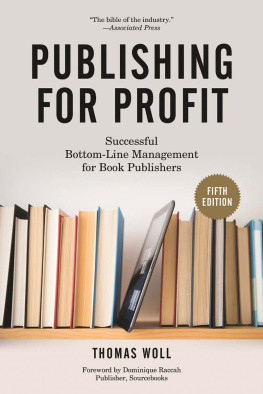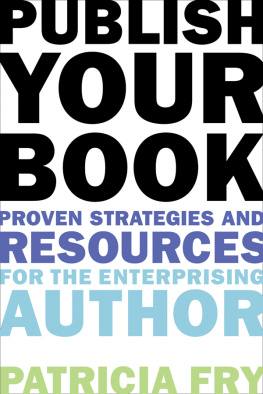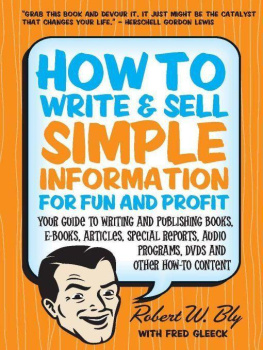
Copyright 2013
by Randy Davila
All rights reserved, including the right to reproduce this work in any form whatsoever, without permission in writing from the publisher, except for brief passages in connection with a review.
Cover design by Adrian Morgan
Cover art by Shutterstock
Text design by Steve Amarillo
Hierophant Publishing
8301 Broadway, Suite 219
San Antonio, TX 78209
888-800-4240
www.hierophantpublishing.com
If you are unable to order this book from your local bookseller, you may order directly from the publisher.
Library of Congress Control Number: 2013945700
ISBN 978-1-938289-16-3
10 9 8 7 6 5 4 3 2 1
Printed on acid-free paper in the United States
www.redwheelweiser.com
www.redwheelweiser.com/newsletter
For my beautiful wife Rachel,
who always encourages me to pursue
my passions and to follow my heart.
So the writer who breeds more words than he needs is making a chore for the reader who reads.
DR. SEUSS
Contents
Introduction
Writing a book will change you.
As a matter of personal accomplishment, it is unparalleled. My friend and fellow author Jacob Nordby says, Holding up your completed book to the world is a watershed moment in your life. I couldn't agree more.
Creating a good book requires the intersection of four things: art, inspiration, craft, and marketing. Many of the writers I meet have a good start on the art and inspiration, but they need improvement in the departments of craft and marketing. If one of your goals is that your book reach as many people as possible, you will have to hone your talents on all four fronts. And if you want to make a living at publishing, you will really have to develop what I call the Author Business Model.
But before we delve into the nuts and bolts of the publishing world, I would like to thank you for picking up your pen, or more likely sitting behind your computer, and writing your book. You see, I have had the pleasure of working with authors from around the globe, both well-published and not-so-well-published, and the one thing they all have in common is that through this sacred craft of writing every one of them is attempting to make the world a better place (even if they may not realize it).
Whether you are writing a self-help book, a history book, a memoir, a novel, or a book in any other genre, the goal of a writer is to educate and entertain the reader, and in so doing contribute to the betterment of humanity. The world needs people like you, so I thank you for showing up.
Whether your book finds an audience here and abroad or you share it with just a few loyal readers, know that your writing will help at least one personyou. Writing is by definition a creative endeavor, one that energizes the mind and nourishes the soul. Although some authors don't realize this at first, writing is one of those conscious creation activities that makes us feel alive, and that's why we do it!
So by writing, whether you are conscious of it or not, you help others and yourself. This is why I often say that every book ever written, in some capacity and regardless of genre, is a self-help book.
A quick peek at history shows that what we are doing as authors does matter, that we are making the world a better place. We are privileged to live in the most literate time in the history of humanity, and literacy and education are inextricably linked. More people have the ability to read today than at any point in our past, and the collective education of this planet has never been higher. Undoubtedly we still have a long way to go, but much of our progress has been made through sharing ideas, and those ideas are recorded in books... books that would not exist without the authors who wrote them.
What a debt of gratitude we owe the authors who have come before us, who were brave enough to publish new ideas that expanded our thinking even when they were unpopular or posed a great risk to the writer's reputation. While there are countless examples of this type of heroism in authorship, one person who comes to mind is Dr. Brian L. Weiss, author of the international best-selling book on reincarnation titled Many Lives, Many Masters: The True Story of a Prominent Psychiatrist, His Young Patient, and the Past-Life Therapy That Changed Both Their Lives.
With degrees from Columbia University and Yale Medical School, Dr. Weiss was the head of the psychiatry department at the Mount Sinai Medical Center in Miami Beach when he wrote Many Lives, Many Masters. Dr. Weiss had much to lose when he began writing about the subject of past-life therapy in the mid-1980s. Well respected by his peers in traditional psychiatry, by his own admission Dr. Weiss had no use for alternative methods of treatment like past-life regression therapy. But then something happened to change all of that. While using hypnosis to help recall traumatic childhood memories, one particular patient went back beyond her childhood, remembering a total of eighty-six previous lives over the course of her months-long treatment. Although Dr. Weiss was very skeptical at first, the healing benefits this patient experienced as a result of excising past-life traumas, combined with the knowledge she received about Weiss's own life from masters on the other side, convinced him that reincarnation was real and that past-life regression therapy could be a useful healing tool.
Despite the objection of many peers in the mainstream medical community, Dr. Weiss made the bold decision to risk his credibility and his career when he decided to publish his findings in a book. No one could have predicted, least of all Dr. Weiss, that the book would go on to sell millions of copies, bring reincarnation and past-life regression therapy into the spotlight, and change so many people's lives in the process.
In the genre of fiction, there are numerous examples of books that use storytelling to not only entertain readers but also challenge existing societal beliefs. Dan Brown's 2003 novel The Da Vinci Code not only captivated millions of readers with its suspenseful twists and turns but also reintroduced the idea of the divine feminine and its influence on mainstream Christianity. The firestorm that ensued after its publication was notable, to say the least.
These are but two examples, and there are numerous others as well, that we authors are a courageous folk. We put our hearts onto paper, risking the ridicule of critics and sometimes even our financial stability all in an effort to share our ideas with the world. Now comes the challenging part, and the likely reason you are reading this book: What can you do as an author to help your book reach the widest possible audience and make the biggest impact on the world?
Well, the good news is that there are many, many things you can do to help accomplish this goal. And that is the purpose of this book, to educate you, the author, about the essential steps necessary to reach as many readers as you can. As you will see in the following pages, there is so much more to being an author than just writing a book and either submitting it to a traditional publisher or self-publishing. At the conclusion of this book, my hope is that you will understand why I often say, Being a good writer is one thing; being a well-published author is something else entirely.
What Is Success?
If you notice, I have not yet used the term successful. I have not said, Do this and make your book a success. Before I begin stating things such as make your book successful, the first thing I want you to do is evaluate your definition of success.
Next page

